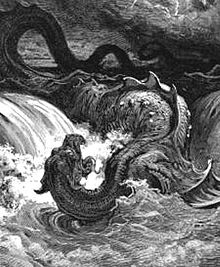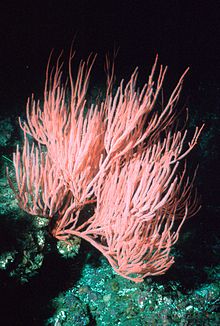The Leviathan (Joseph Roth)

The Leviathan is a story by Joseph Roth first published in 1938 in the "Pariser Tageszeitung" (with the title Der Korallenhaendler , "Das Neue Tage-Buch", December 22, 1934).
content
The pious Jewish coral trader Nissen Piczenik lives unhappily married, childless and far from any education in the Galician town of Progrody , which he never left in his life. He has an almost idolatrous love for the corals: for him they are living animals that grow up on the seabed under the care of the legendary primeval fish Leviathan . Processed into jewelry by his threaders and sold to the peasant women in the area, they are not only able to avert the " evil eye " of children , but also blossom on the breasts of beautiful, young, healthy women, while they wither on those of ailing women.
Piczenik's longing for the sea, the home of his revered creatures, is correspondingly great. The marshes around Progrody are just a very imperfect substitute. That is why he meticulously asked the passing sailor Alexander Komrower to explain the world of the ocean and shipping to him, heard about divers, telescopes and whale fish, and listened to all sorts of sailor's thread in Podgorzew's tavern over “ninety-degree schnapps” . Ultimately, he even accompanies Komrower on his embarkation for Odessa .
During the journey, the formerly “continental” Piczenik in its innocent and pious simplicity is increasingly transformed into an “oceanic”, the daring, cosmopolitan Piczenik. Already on the train he defends "his" corals with an eloquence that is unfamiliar to him against the presumption of the Petersburg pearl merchant Gorodotzki that he himself is selling the real treasures of the sea. When he arrived in Odessa, he boldly posed as Komrower's uncle, smuggled himself on board his armored cruiser and asked the naval lieutenant to explain “ mast and bow ”, “ deck and stern ”, “ cruiser and merchant ship”. At the same time, during the three-week stay he forgets "the duties of an ordinary Jew from Progrody", no longer goes to the house of prayer , even bare his head against the commandments of his religion "in front of the radiant white and gold splendor of the officer" .
Shortly after Piczenik's return, the enterprising polyglot Hungarian Jenö Lakatos also opens a coral shop in the neighboring town of Sutschky and sells his goods at a fraction of Piczenik's prices. During his visit to Sutschky, Lakatos reveals his secret: they are artificial corals, visually flawless but made of celluloid , "which burn bluish when you light them like the hedge fire that surrounds Hell". With the impending bankruptcy in mind, Piczenik has Lakatos send him twenty puds of false corals. He mixes them with his own real corals and sells the whole thing for the old price.
As a result, the usurer Warschawsky , to whom Piczenik brought the dishonestly acquired money, dies first . Soon afterwards, the grandchild of the hop trader, who had Piczenik's false corals around his neck, fell victim to diphtheria . The plague spreads, Piczenik's corals get a reputation for bringing disaster. The dead of winter falls on Progrody, after a fall on the icy road, Piczenik's wife finally dies of a concussion. The customers stay away, Piczenik, shunned by everyone and a broken man becomes a regular in Podgorzev's tavern, where he succumbs to alcohol and fornication .
In order not to become a mockery of the town, he finally decides to emigrate to Canada . During the crossing, the Phoenix is shipwrecked. Piczenik doesn't even try to save himself. Rather, he falls "overboard into the water (...) to his corals, to his real corals", in order to "rest in peace next to the Leviathan until the arrival of the Messiah ".
interpretation
Multiculturalism
"The Leviathan", like many of Joseph Roth's works, ideally combines three different cultures.
The story takes place in one of those Eastern European Stetl that embody the culture of Ashkenazi Judaism in a special way : with synagogues , prayer robes and straps , the Jewish holidays and fasting days , but also all the moneylenders, water carriers, butchers, innkeepers and small traders which the cliché is wont to populate such places. But Jewish ideas are also present in many other ways, in the name of Jehovah, for example, in the Leviathan , the Old Testament monster, the thought of temptation by the devil .
The second culture is that of Russia , to which the part of Poland in which the fictional town of Progrody is located belonged before the First World War . First of all, the tsarist empire is present in the sleepy nest at best through the train station and the imperial post. The sailor Komrower also brings a touch of Saint Petersburg to the provinces when he reports on the glorious deeds of Tsarina Katharina against the King of Sweden . With Piczenik's departure for Odessa , Russia moves entirely to the center . On the train he discusses with a purveyor to the royal household, he has to change trains in Kiev , on the Black Sea he even has a lieutenant of the Imperial Russian Navy explain a warship to him.
After all, the story is also rooted in German culture, as it was written in German by an Austrian-Hungarian author and is therefore included in German literature .
Temptation theme
The Leviathan represents a parable , a parable-like narrative that deals with a moral problem in a pointed form . Here it is the subject of temptation by evil that makes an honest, righteous person betray his values and ideals . In Piczenik's case, it's not just his love for the real corals, but also his Jewish identity .
The tempter is primarily represented by the Hungarian businessman Jenö Lakatos, who clearly bears traits of the Judeo - Christian concept of the devil : Examples include the “smooth, blue-black, pomadized hair” and the “mouse teeth” with which theater directors usually equip Mephistopheles . "His dark eyes (...) glowed so strongly from second to second that a strange blush glowed in the middle of their blackness". His "slender body (...) smells enormous and numbing". He also limps as a result of a shortened left leg. Not to be forgotten, of course, are the “black-gray ringed ash” and the “gray-blue smoke of the celluloid ” that Lakatos' products leave behind when they are burned.
Ultimately, however, the leviathan is also a diabolical being , the monster of Old Testament mythology resting on the seabed , before the one according to Job 41: 25ff. EU will put all human resistance to shame, which according to Psalm 74:14 EU only the Lord himself can defeat. “There is terror around his teeth (...) torches come out of his throat and fiery sparks shoot out, (...) his heart is as hard as a stone (...) when he rises, the strong (...) on earth are terrified is not his kind, he is a creature without fear ”. In the story, he stands for the sea that Piczenik casts his spell over his entire life in order to make him forget his homeland and his Jewish roots and finally devour him. Significantly, the Leviathan is considered the god of evil in Hungary - in the homeland of the businessman Jenö Lakatos.
Why of course, God the corals, which indeed embody the real, true and good in the narrative, until the coming of the Messiah precisely the care of his opponent, the Leviathan , entrusted remains an unresolved contradiction, but not only in the aforementioned book of Job a self Finds parallel, but basically represents a central problem of the entire eschatology .
coral
A central motif of the story is the coral , for the protagonist the epitome of the good and the beautiful. The descriptions of these “noblest plants of the oceanic underworld”, “the roses for the capricious goddesses of the seas”, are correspondingly varied and rich in detail. A reference to “blood” and “life” always shimmers through in the background. If, for example, some corals are compared with “firm, round drops of blood”, if an interaction is established between the shine of the corals and the state of health of their carriers, “as if they were feeding on the blood of women (...) on the firm, white necks of women, in close proximity to the living artery , the sister of the female heart . " Or when Piczenik contrasts the sterility of his own wife, "dry as a pond", with the fertility of the sea, "on the bottom of which so many corals grew". Accordingly, he sees the corals as a substitute for those children whom his marriage has denied him.
Autobiographical
Sometimes autobiographical moments can also be discovered in the Leviathan. Joseph Roth, for example, comes from the little Galician town of Brody near Lemberg , which not only was the sonic godfather of the fictional town of Progrody, but also similarly belongs to the unmistakable Eastern Jewish culture. There is, of course, a difference insofar as Lemberg belonged to the Austro-Hungarian part of Galicia and was thus ruled from the imperial court in Vienna , not from the Tsar in Saint Petersburg .
There is also a parallel to the physical and moral decline of the protagonists in the life of the author, who became severely addicted to alcohol in the last years of his life in Paris (see The Legend of the Holy Drinker ).
Quote
"... he wasn't just drowned like the others. Rather, he had returned ... to the corals, to the bottom of the ocean where the mighty Leviathan curls. "
Text output
- Joseph Roth: The Leviathan. Narrative. 4th edition. Kiepenheuer u. Witsch, Cologne 1999, ISBN 3-462-02082-X .
- Joseph Roth: The Leviathan. Novella. After the first printing in 1938. With commentary and afterword. Edited by Konstanze Fliedl . Reclam, Stuttgart 2010, ISBN 978-3-15-018685-5 ( Reclam's Universal Library 18685).
- The Leviathan in the Gutenberg-DE project
literature
- Jürgen Heizmann: "The oceanic feeling. On the symbolism of water in Joseph Roth's Leviathan ." In: The wave. Edited by Hans-Günther Schwarz, Geraldine Gutiérrez de Wienken and Frieder HEPP. Munich 2010, ISBN 978-3-89129-952-4 , pp. 110-119.
